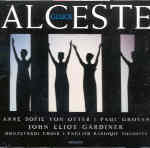Considering that this opera is a great, deep story of hopelessness, undying love, and nobility of purpose, word, and deed, this performance is strangely unmoving. Perhaps in order for Gluck’s straightforward operatic tales of splendid beings to be effective they have to be performed incorrectly; to be sure, the recent release of a recording of this opera in Italian, filled with Sturm and Drang and starring the vocally fascinating-if-overly-dramatic-and-somewhat-defective Leyla Gencer, is more riveting than this oh-so-authentic reading.
John Eliot Gardiner and his players make wonderful sounds, some big and sort-of scary, others mellow and supportive of the characters’ sad plights. His tempos are just right. Anne Sofie von Otter is an intelligent artist who plays off the words and sings beautifully (some of her music is transposed down to accommodate her mezzo range), but Gencer (and even Jessye Norman on Orfeo) makes you want to cry at Alceste’s plight; Otter merely makes you appreciate it. There’s nothing she does wrong, but there’s also something missing. Tenor Paul Groves has a bright, expressive voice that he uses with ardor as Admetus; Dietrich Henschel’s baritone is just right for the noble character and potency of both the High Priest and Hercules. The rest of the cast is impressive, and the chorus, which really knows how to lament, is superb–although its off-stage utterances at times are almost inaudible. This is a very classy release and I know in my heart and head that it represents Gluck’s opera superbly. It’s also just a bit dull.
































